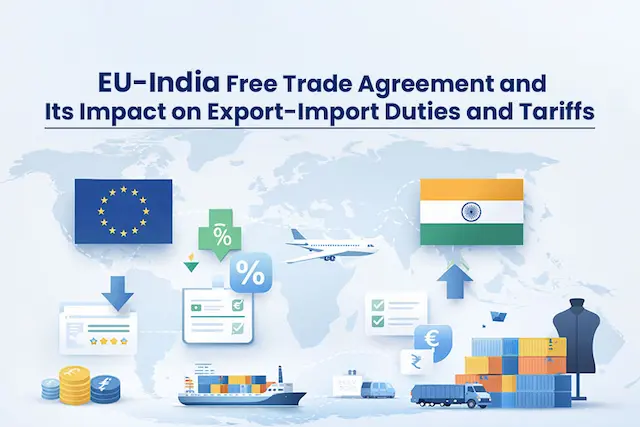In international trade, errors in the documentation may cost time and money or divert goods to the incorrect destination. Thus, the Shipper Letter of Instruction forms part of the procedures by exporters and freight forwarders to ship goods across borders. This basic document, often overlooked, can facilitate ease in communication and lower the number of errors that occur when goods cross borders.
This blog defines SLI, why it matters, and how it can assist exporters in transporting goods through international borders efficiently and compliantly.
SLI in Export Operations
Familiarisation with the rudiments of this document will facilitate effective international shipping.
What Is a Shipper’s Letter of Instruction?
The Shipper Letter of Instruction can be described as a formal document prepared by the exporter to tell the freight forwarder how to treat a given cargo. It contains important guidelines regarding routing, handling, documentation, delivery preference, and the persons who should receive important paperwork.
In some countries, the SLI is not essential but highly advised because of the clarity that is created when it comes to assigning duties and expectations between the freight partner and the shipper.
Who Prepares and Uses It?
The exporter generally completes the SLI and submits it to the freight forwarder. This is then used as a reference point by the forwarders to prepare the bill of lading, file export declarations, and make bookings. The SLI, in a way, is the blueprint for the smooth passage of cargo between origin and destination.
Key Details Found in a Shipper’s Letter of Instruction
The information that should be included in an SLI should be known before you start creating it.
1. Basic Shipment Information
SLI contains the information such as:
- Consignee and shipper name and address
- Origin and destination of shipment
- Number of packages and weight
- Preferred means of transportation (fly, ship, motorway)
This preliminary information will help the forwarder to have full details of what it is dealing with.
2. Documentation and Freight Instructions
This part informs the freight forwarder:
- Who pays for freight–Prepaid or collect
- How to handle customs documents
- Insurance requirements
- Special requirements for handling the cargo (if any)
The instructions should be clear, so that there are no delays because of lost or misplaced paperwork.
3. Export Control and Compliance Declarations
The Letter of Instruction of the Shipper also ensured compliance with the regulations, as it contains:
- Regulations concerning export licenses (in case there are any)
- ECCN/ HS codes
- Country of origin
- Any prohibitions or embargo remarks
This information assists in making sure that the product is shipped following the local and trader laws.
Why is the SLI Critical for Exporters
The entire supply chain gets substantial benefits from having a well-prepared SLI.
1. Minimizes Errors in Documentation
Most of the hassles in international logistics start with flawed or incomplete papers. The SLI offers a single point of truth so that during the preparation of the bill of lading or the customs forms, the freight forwarder can submit the right information.
2. Improves Shipment Visibility and Accountability
As the Shipper Letter of Instruction contains all the roles and responsibilities, it becomes convenient to trace the accountability in case any problems occur. It safeguards the exporter since it ensures the validity of the instructions he/she had issued to their logistics partners.
3. Speeds Up Customs Clearance
It is better to have all export-related details in advance so as to prevent confusion in the process of customs clearance and to avoid delays in the shipment schedules.
Common Mistakes to Avoid When Using an SLI
Although it is undoubtedly a valuable tool, it is evident that the SLI is not used by many exporters. Here’s what you need to be aware of –
1. Incomplete or Vague Instructions
An incomplete SLI will confuse freight partners and expose them to erroneous booking or documentation. Exporters must be precise in mentioning the terms of delivery, requirements of handling, and the consignee.
2. Not Updating the SLI for Each Shipment
Every export order is unique. Not customising a template to a new shipment can be subject to errors. The letter of instruction addressed to the Shipper must be newly written and revised on each transaction.
3. Ignoring Regulatory Requirements
Non-compliance issues may arise due to the omission of the correct HS codes, the number of export licenses, or the warnings about restricted destinations. The SLI must always be compared with the recent trade regulations.
How the SLI Supports Smooth International Logistics
The SLI also forms a crucial part of the logistics planning process beyond documentation.
Enables Efficient Coordination Between Parties
The SLI keeps everyone in line, including the exporter, freight forwarder, customs broker, and the consignee. This eliminates panic calls or changes and creates a more efficient shipping process.
Aligns with Trade Digitization Trends
Most digital freight providers have now allowed exporters to electronically issue the Shipper’s Letter of Instruction. This aligns with the modern trends of trade process digitalisation, paperwork reduction, and manual error elimination.
Simplify Global Shipping with Smart Documentation
The best thing that can be done to avoid disruptions in international trade is a clear, accurate, and complete shipper’s letter of instruction. It is a core link in communications between exporters and logistics partners, although it is often treated as optional. In cases of developing businesses venturing into overseas markets, the availability of an SLI may spell the difference between a delay and an efficient supply of goods.
Regardless of whether you are shipping goods out of India or any other country, Credlix will assist you more comfortably in international shipping. We provide working capital, digital documentation services, and trade finance solutions to ensure that you can schedule faster shipments without worrying about delays.




